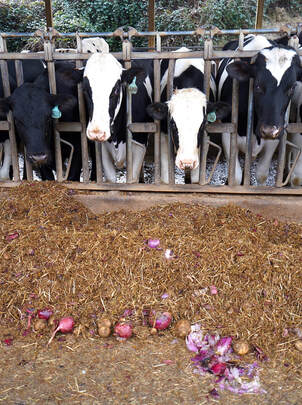 US dairy cows upcycle over 300 million pounds of food waste every day. Much of the food waste going to cows comes from food byproducts that humans can’t eat but cows can - like potato peels and onions from a local potato chip maker, brewery grains and yeast from beer breweries, spent grains from local bakeries, hazelnut hulls, cotton seed from making clothing, biodiesel byproducts, and more. Dairy cows possess a superpower: an incredible 4-chambered stomach and digestive system that allows them to eat these various byproducts as part of their regular diet. If these byproducts weren’t upcycled on dairy farms, they would pile up at factories or end up in landfills. In fact, it’s estimated that large manufacturers divert around 77% of their food byproducts to animal feed. Diverting these byproducts from landfills reduces methane and greenhouse gases and frees up the land for other uses - like crops for human food production. Animal nutritionists work with farmers to create specialized diets for cows at every life stage, and work to incorporate a variety of food byproducts that cows will enjoy. Not only are these byproducts highly nutritious for cows, but feeding cows has emission reduction benefits too. The carbon emissions of sending byproducts to a landfill for incineration is 60% greater than feeding them to cows. By taking on byproducts, dairy farms help other industries operate smoothly and add value to the local food system. Byproducts make up 30% of the world’s agricultural production. Finding a place to upcycle byproducts is essential to the operations of many businesses and industries. What’s more, sending byproducts to help feed dairy cows is a great way to reduce food waste and certainly helps businesses keep costs down, particularly for the farmers. One example here in Oregon is the innovative partnership between Oregon breweries and dairies. Brewers extract a small amount of sugar from grain during their brewery process; about 85% of brewer waste comes from this process. According to a recent estimate, up to 20 billion lbs. of BSG is produced in the USA each year. Using byproduct grains from brewers can provide beneficial nutrients to dairy cows and help farmers control their feed costs. By working together brewers and dairy farmers can keep their production cycles operating smoothly and prevent substantial byproducts from going to landfills. In Oregon, we have some great examples of farms working collaboratively with food and beverage manufacturers to divert food waste by upcycling byproducts. For example, a local dairy farm receives about over 3,000 gallons of yeast water from a two local breweries each week, which they use to top dress their total mixed rations. It's a substantial byproduct - they have 4 tanks reserved on the property for it. Yeast water contains a little bit of protein, which helps the grains to stick to each other and is nutritionally beneficial for their herds. What’s more, the manure from their farm is used at many of the neighboring vineyards in the area. The delicious dairy foods made here in Oregon come from good milk, derived from healthy and happy cows. It is a wider food industry collaboration to support feeding these cows with nutritious byproducts to help businesses reduce costs, keep food waste low, and support others in the community. | Oregon Dairy and Nutrition Council This guest blog was submitted by the Oregon Dairy and Nutrition Council (ODNC). For more information on guest blog opportunities, contact Marla McColly, Business Development Director, Oregon Restaurant & Lodging Association.
Comments are closed.
|
Categories
All
Archives
June 2024
|
Membership |
Resources |
Affiliate Partners |
Copyright 2024 Oregon Restaurant & Lodging Association. All Rights Reserved.
8565 SW Salish Lane Suite 120 | Wilsonville, OR 97070-9633 | 503.682.4422 | 800.462.0619 | Contact Us
Site Map | Accessibility | Privacy Policy
8565 SW Salish Lane Suite 120 | Wilsonville, OR 97070-9633 | 503.682.4422 | 800.462.0619 | Contact Us
Site Map | Accessibility | Privacy Policy

 RSS Feed
RSS Feed


